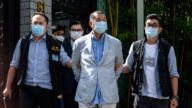【新唐人2012年10月30日訊】近年來,中國大陸不斷上演普通民眾「被精神病」的事件。很多人批評,精神病院已經成為當局打壓上訪者和異議人士的工具。最近中共全國人大表決通過《精神衛生法》。其中規定:「精神障礙的住院治療實行自願原則」。那麼這一法律是否能夠終結「被精神病」現象呢?請看本臺記者的報導。
10月26號,中共十一屆全國人大常委會第29次會議表決通過《精神衛生法》。這一法律是中國大陸關於收治精神病人的第一步法律,歷經27年才得以出臺。
大陸媒體號稱,當初起草這部法律的關鍵並不是為了防止「被精神病」,但隨著一系列「被精神病」事件的被曝光,這一內容成為立法的核心問題。
2003年10月,河南漯河農民徐林東因為反映情況,被鄉政府強行送進漯河市精神病院,非法關押長達六年半。
2006年,「武漢鋼鐵集團公司」職工徐武,因狀告單位不公待遇,而被警方和信訪部門送進「武鋼職工二院」精神科,長達4年。
2009年12月,「深圳市第二人民醫院」護士郭俊梅到信訪辦反映情況,被深圳市「康寧醫院」故意診斷為「偏執性精神障礙」,郭俊梅被強行住院治療。
而這部《精神衛生法》將於明年(2013年)5月1號實施,其中規定:精神障礙的住院治療實行自願原則。自願住院的精神障礙患者可以隨時要求出院。但同時規定:診斷為嚴重精神障礙患者,並且「可能危害他人安全的」,可以由公安機關採取強制措施。
那麼,到底該由誰來鑑定精神障礙呢?《精神衛生法》規定,診斷應當由精神科執業醫師作出。但現實是,大陸的精神病院和精神科醫生往往聽命於當局,出示假鑑定結果。比如:上述「被精神病」的郭俊梅,就被司法鑑定醫師高北陵故意診斷為「偏執性精神障礙」。而「武漢鋼鐵集團公司」職工徐武的父母,則在警方和信訪部門「不簽就判刑」的巨大壓力下,被迫在送兒子到精神病院的文件上簽字。
北京律師唐吉田:「今後的話,應該考慮相應的這些醫療機構有更大的獨立性、更多的專業性,它只對病情和事實負責,而不應該摻雜其他的一些因素。」
北京律師唐吉田認為,中國大陸每一次權力格局的調整都非常困難,但和生命健康相比,一切都不該成為阻礙。
唐吉田:「如果說濫用了公權力、或者公權力干預插手醫療活動,插手醫療的這種專業的業務範圍,那麼顯然存在著對當事人權益侵犯的現實可能。」
網民也質疑《精神衛生法》能夠解決「被精神病」的問題,有網友表示:被精神病現象是一種中國現行制度下官本位思想的產物,是這部法律能解決的嗎?
香港居民朱柯明,曾經因為起訴江澤民迫害法輪功,而被投入監獄,遭受殘酷迫害,他認為,這部法律有很大矛盾,實際上,真正的精神病人基本不會自願治療。朱柯明說,中共出臺《精神衛生法》只是為了在人權方面掩人耳目,給鎮壓找藉口。當局可以對外宣稱:所有被關押的人都是自願治療的。
「訴江第一人」朱柯明:「它(中共)不管甚麼法律,你是絕對不能相信的。它是沒有法律的,尤其是在迫害法輪功上是沒有法律的。現在這麼多人被迫害死了,這麼多人被送到精神病院去被迫害、被打藥物,成精神不正常了,甚至給迫害死了,太多太多了。它從來沒有說是按照法律來做甚麼事情。」
朱柯明指出,實際上,中共體制號稱為人民服務,但官員做的很多事情,比如:殘酷打壓抗議民眾、貪污腐敗、出賣領土、活摘器官等等,都是精神不正常的表現。
採訪/田淨 編輯/李謙 後製/君卓
Will Cases of “the Authorities-Alleged Psychotic Patients”
Stop Recurring in China?
In recent years, cases of “the authorities-alleged
psychotic patients” have continued to emerge in China.
Mental hospitals have become a tool for the Chinese Communist
Party (CCP) regime to repress petitioners and dissidents.
A Mental Health Act was recently approved by votes
at the CCP’s National People’s Congress.
The Act stipulates that “hospitalization of psychotic patients
is made on a voluntary basis.”
Can this Act help to end the incessant occurrence of
“the authorities-alleged psychotic patients” cases?
On October 26, the 29th session of the 11th CCP National
People’s Congress passed a Mental Health Act.
This is the first law introduced in China on treating
mental patients, after 27 years of legislative process.
China’s media claimed that the law originally was not aimed
at preventing cases of “the authorities-alleged psychotic patients”.
However, cases of “the authorities-alleged psychotic patients”
continue to be exposed.
In this context, preventing from being “the authorities-alleged
psychotic patients” became the key reason for introducing the law.
In October 2003, Xu Lindong, a peasant in Luohe,
Henan province
was forcibly sent into local mental hospital for petitioning.
He was illegally detained there for up to six and a half years.
In 2006, Xu Wu, an employee Wuhan Iron& Steel Group,
petitioned over the company’s injustice.
Local police and petition officers confined Xu Wu in a local
hospital’s psychiatric department for over four years.
In December 2009, Guo Junmei, a Shenzhen hospital nurse,
was diagnosed with paranoid mental disorders for petitioning.
The diagnosis was made by Kang Ning Hospital of Shenzhen,
which is operated directly under the municipal Commission
for Health, Population & Family Planning. Guo Junmei was hospitalized by force.
This Mental Health Act will be in effect on May 1, 2013.
It stipulates that hospitalization of psychotic patients is made on a voluntary basis.
And that the voluntary in-patient with mental disorders can
request a hospital discharge at any time.
The Act also provides that if a patient is diagnosed with
severe mental disorders and that he “may endanger others』 safety”,
the public security organs can
take coercive measures against him.
Who are the authorities to identify mental disorders?
The Mental Health Act sets that diagnosis shall be made
by psychiatric practitioners. This is in contrast to reality.
China’s psychiatric hospitals and psychiatrists work for
the authorities to produce false diagnoses.
For example, forensic psychiatrist Gao Beiling diagnosed
Guo Junmei with paranoid mental disorders.
Xu Wu’s parents, threatened by local police and
petition officers, were forced to sign for Xu Wu’s hospitalization as a psychotic patient.
Tang Jitian(Lawyer, Beijing): “In the future, these medical
institutions should be endowed with greater professional freedom.
They should be responsible only to medical service,
instead of being involved in other matters.”
Tang Jitian says that in China, it is always difficult
to make changes in the political power set up.
However, in matters of life and health,
Nothing should be an obstacle.
Tang Jitian: “If a case involves the abuse of public power,
such as intervening in medical treatment professional practice,
the parties concerned may be infringing rights.”
Chinese netizens questioned whether the Mental Health Act
may solve the problem of “the authorities-alleged psychotic patients”.
A netizen asked, “The issue of the authorities-alleged
psychotic patients is a result of the official standard system operated in today’s China, can it be resolved by this Act?”
Hong Kong citizen Zhu Keming was imprisoned and tortured
by the CCP authorities for suing Jiang Zemin for his launching of the persecution of Falun Gong.
Zhu Keming says that there exists a contradiction in this law.
Real psychotic patients basically do not ask for voluntary
hospitalized treatment.
This Mental Health Act actually aims to cover up the truth
about the human rights situation in China,
Zhu Keming remarks. It also serves as an excuse for the
authorities to put down dissent.
In this way, the authorities may declare that all detainees
choose hospitalization on their own volition.
Zhu Keming: “You simply cannot trust any CCP law.
Its action has no legal bearing, especially on its persecution of Falun Gong.
So far, there’re so many Falun Gong practitioners killed
by torture in detention.
Numerous Falun Gong practitioners have been sent into
mental hospitals, injected with unknown drugs causing mental disorders and even death.
The regime never dares to claim it was following laws
in the commission of these actions.”
Zhu Keming remarks that in reality, CCP officials have
presented mental disorders as a reason for what they have done.
Such as brutal suppression of mass protests, corruption,
selling of China’s territories, and live organ harvesting.





























